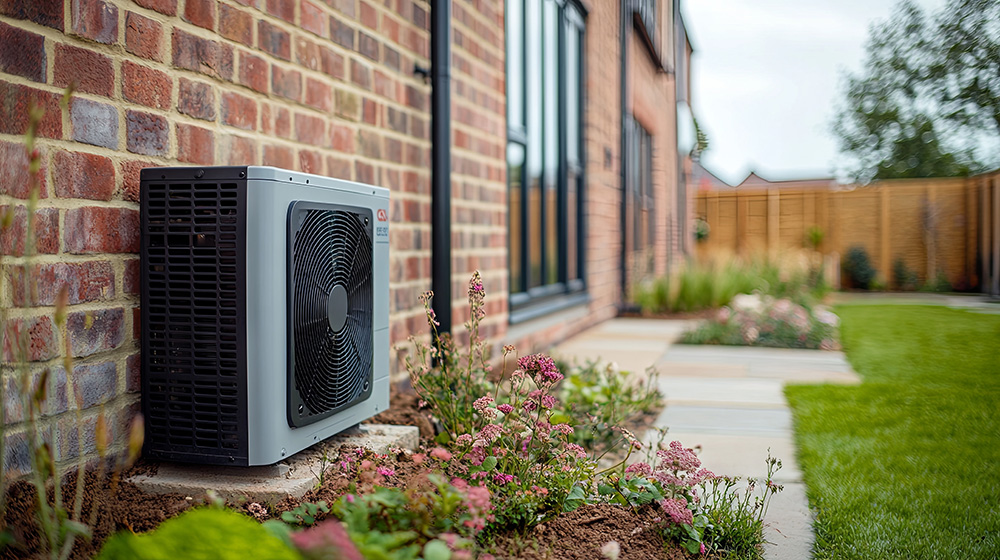How do air source heat pumps work?
If you want an eco-friendly way to heat your home, air source heat pumps (ASHPs) are becoming very popular.
But how do they work, and are they right for your home? This guide explains everything in simple terms: efficiency, costs, pros and cons, and what installation involves.
What is an air source heat pump?
An air source heat pump takes heat from the outside air and uses it to warm your home and water. Even in cold weather, there’s some heat in the air. The pump captures it and moves it indoors through radiators, underfloor heating, or hot water tanks.
It works a bit like a fridge in reverse – it takes heat from one place and moves it somewhere else.
Unlike traditional gas or oil boilers, air source heat pumps provide heat at lower temperatures. This means they run longer to keep your home cosy, but they can save energy over time, especially in well-insulated homes.
How do air source heat pumps work?
Here’s how they do it in simple steps:
- Air collection: The outdoor unit pulls in air, even when it’s cold.
- Heat extraction: A special fluid inside the pump absorbs the heat.
- Compression: The fluid is compressed, which makes it hotter.
- Heat transfer: The heat goes into water that warms your home.
- Cycle repeats: The fluid goes back outside to collect more heat, and the process continues.
Some pumps can also cool your home in summer by sending cooler air inside.
How efficient are air source heat pumps?
ASHPs are very efficient. For every 1 kWh of electricity they use, they can produce 3–4 kWh of heat. That’s much more efficient than regular electric heaters.
Efficiency depends on your home’s insulation, the size of your pump, and the local climate. To get the best results, you may need bigger radiators or underfloor heating. A well-insulated home will save the most energy and money.
Can air source heat pumps cool your home?
Yes! Many modern pumps are reversible. In summer, they can remove heat from inside your home and send it outside, like an air conditioner. This makes them useful all year round.

Are air source heat pumps noisy?
The outdoor unit does make some sound, but modern pumps are usually quiet – about the same as a running fridge.
Placement matters. Keeping it away from bedrooms and neighbours helps. Good installation and maintenance also keep noise low.
Pros and cons of air source heat pumps
Pros:
- Energy-efficient and better for the environment
- Can lower heating bills
- Provides both heating and cooling
- Easier to install than some alternatives
Cons:
- Needs space outside for the unit
- Not zero-carbon if your electricity isn’t green
- Some units can be noisy if placed badly
- Higher upfront cost than a boiler
Costs and financial benefits
A typical air source heat pump costs around £10,000 to install. But it can save money over time and reduce carbon emissions by about 44% compared to standard heating systems.
Savings vary depending on your current heating setup. The most effective savings come with good insulation, bigger radiators, or underfloor heating.
What’s involved in installation?
- Property check: A professional surveys your home.
- Indoor unit: Installed on a wall or floor.
- Connecting lines: Holes are drilled to connect indoor and outdoor units.
- Pipes and wiring: Carry heat and power the pump.
- Outdoor unit: Placed on a concrete slab or flat area outside.
- Final checks: Thermostats and sensors are tested to make sure everything works efficiently.
A professional installer will guide you and give an estimate of your energy savings.
Is an air source heat pump right for you?
Air source heat pumps are a good choice if you want lower energy bills, fewer carbon emissions, and comfort all year. They work best in well-insulated homes with space for an outdoor unit.
If you’re replacing an old boiler or electric heating, or want summer cooling, an ASHP is worth considering.
In short, air source heat pumps:
- Capture heat from the air
- Warm your home and water efficiently
- Can cool your rooms in summer
While the upfront cost is higher than a boiler, the long-term savings, eco benefits, and year-round comfort make them an attractive option.
A professional installer can check your home and suggest the best system for your needs.
If you have any more questions regarding air source heat pumps, or you require anymore additional information about the services we provide through Howarth, please visit your local Howarth branch, or contact our customer services on 01472 907051.
Recent Posts
-
How to Lay Vinyl Flooring
So, you've purchased a bunch of lovely vinyl flooring... Now what? Well, now it’s time to fit it! So
-
A Complete Guide to Wall Rendering
Rendering your walls is one of the most effective ways to protect your home, improve insulation, and



